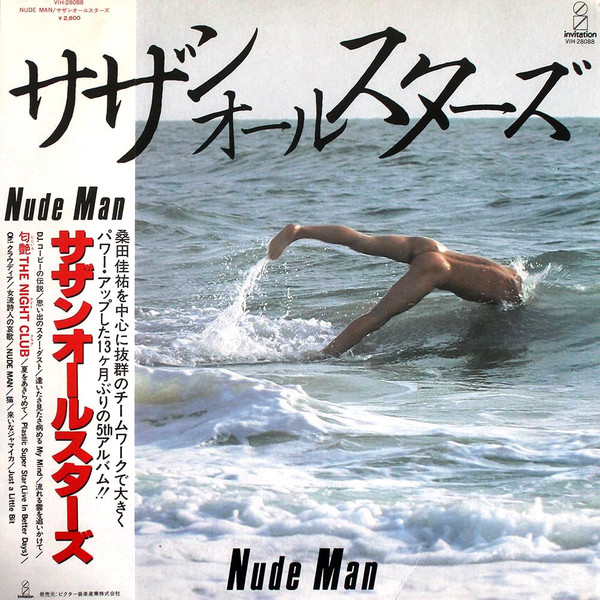THE HISTORY
There's a lot of conversation on what is considered the birth of city pop. The two most common are Sugar Babe's 1975 album, SONGS, and Happy End's seminal 1972 album, Kazemachi Roman. However, there is one contender that has been brought up recently in the form of the 1973 album, Skyscraper Heroine (摩天楼のヒロイン) by Yoshitaka Minami (南佳孝).
Like many kids from his era, Yoshitaka Minami is a singer-songwriter who, like many youths in his time, grew up with western music thanks to the influence of his older brother & sister. He especially had an affinity for jazz, which would influence most of his singer-songwriter career. After winning 3rd place in the Live Young! singing competition in Fuji TV, he would go on to pursue a solo career.

In search of a producer for his debut album, Minami teamed up with lyricist and former Happy End drummer, Takashi Matsumoto (松本隆), who at the time was working under the Kaze Toshi agency, headed by his old school friend and Happy End manager, Shinzo Ishiura ( 石浦信三). Together they aimed to create an urban pop album inspired by classic Hollywood movies, to contrast with the oversaturation of folk songs at the time. As Matsumoto himself put it, Skyscraper Heroine takes the cityscape atmosphere from his previous album, Kazemachi Roman, and turns it into a "deformed afterimage". The crew for this album includes the original Tin Pan Alley team as well as bassist Ray O'Hara (小原礼), Taisuke Shindo* on bongos, Takeru Muraoka (村岡建) on sax, Hiroki Komazawa (駒沢裕城) on steel guitar, Masahiro Takekawa (武川雅寛) on violin, and Makoto Yano (矢野誠) on piano & synths. Unfortunately, Matsumoto ended up overtaking much of the production of this album, leaving little room for Minami to express his own creativity. On top of that, the record was not commercially successful, to the point where Kaze Toshi ended up going bankrupt thanks to the cost of the orchestral arrangements. Despite the setbacks, Skyscraper Heroine ended up becoming a cult classic and established Yoshitaka Minami as part of the pantheon of pioneers in City Pop.
THE MUSIC
SIDE A: Hero Side
おいらぎゃんぐだぞ [Oira gyangu dazo /
I’m a Gangster]: ⭐⭐⭐⭐⭐
弾丸列車 [Dangan Ressha / Bullet Train]:⭐⭐⭐⭐⭐ 吸血鬼のらぶしいん [Kyūketsuki no ra bushi in / Vampire's Love Scene]: ⭐⭐⭐⭐ ここでひとやすみ [Koko de Hito Yasumi / Here we Take a Break]: ⭐⭐⭐⭐ 眠れぬ夜の小夜曲 [Nemurenu Yoru no Sayokyoku / A Serenade on a Sleepless Night]:⭐⭐⭐ 勝手にしやがれ [Katte ni Shiyagare / Do it at Your Own Pace]:⭐⭐⭐⭐
摩天楼のヒロイン [Matenrō no Hiroin / Skyscraper Heroine] : ⭐⭐⭐⭐⭐ 夜霧のハイウェイ [Yogiri no Haiuei / Foggy Highway in the Night]: ⭐⭐⭐⭐ 春を売った女 [Haru o Utta Onna / The Woman That Sold Spring]: ⭐⭐⭐ 午前七時の悲劇 [Gozen Shichi-ji no Higeki / Tragedy at 7 AM]: ⭐⭐⭐⭐⭐
THE VERDICT ⭐⭐⭐⭐
Skyscraper Heroine was ahead of its time, creating an atmosphere that teleports you to a gothic film noir. Songs like I’m a Gangster and the titular Skyscraper Heroine serve as introductions to our mysterious yet whimsical main characters, the leading man & lady respectfully. While the funky psych-rock grooves of Bullet Train and Foggy Highway in the Night serve to paint the setting of their world; a dark, dangerous, yet exciting cityscape. The latter song even includes the sounds of a car crash to further emphasize the lethality of the city. The album's finale, Tragedy at 7 AM, feels like a depressing Tom Waits piece that brings the entire story to a tragic end. Of course, there are other songs that might not fit into a larger narrative but still hold their own; Vampire's Love Scene for example is a gothic ballroom number shifting between a waltz and a cha-cha that would fit well into a 50’s horror drama.
The album's consistent tone is thanks to Yoshitaka Minami’s silky smooth crooning voice combined with the record’s unique blend of dark jazz mixed with funk, reggae, & rock to create a sound that's both vintage and refreshing. I would imagine this is what a noir film soundtrack would sound like if it was sung by Bing Crosby and produced by Frank Zappa. Overall, Skyscraper Heroine has to be the most unique and underrated City Pop album of the ’70s. If you’re a fan of city pop but want something that’s not the regular sunshine pop you’re used to, or if you are a fan of that noir aesthetic and want something refreshing, this is the album for you.







No comments:
Post a Comment